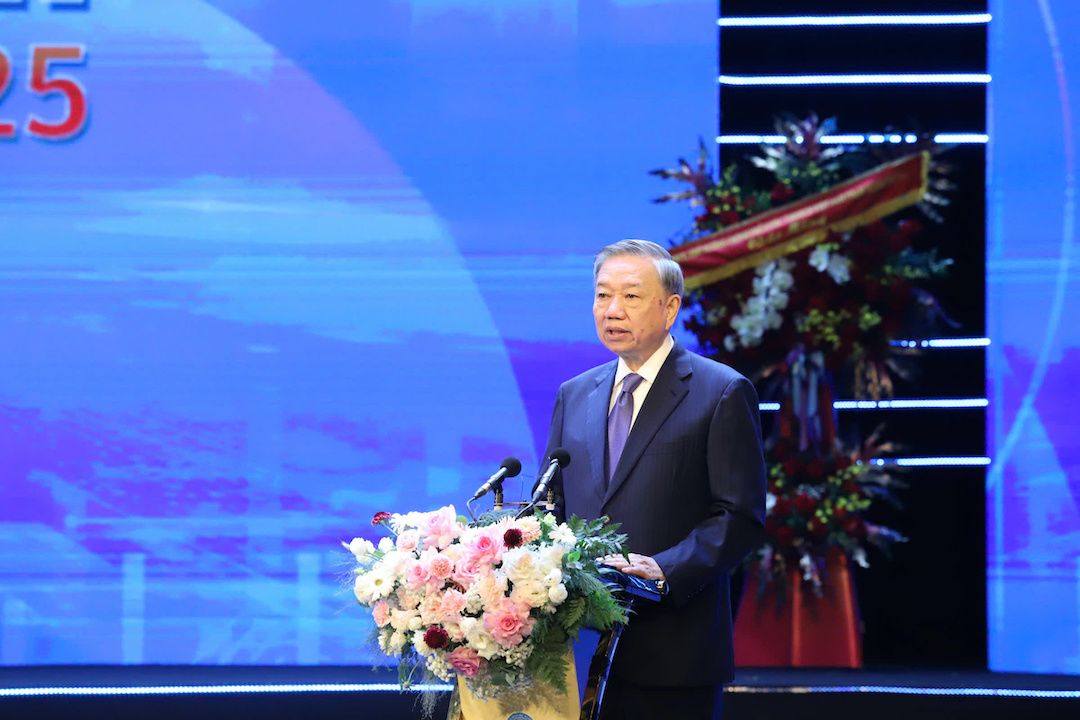HCMC — As Vietnam enters a new phase of growth and national renewal, Party General Secretary To Lam has urged the Ministry of Finance to place a greater focus on regulating the securities, gold, foreign exchange, and derivatives markets to attract more investment and improve private sector access to capital.
The call came during a ceremony in Hanoi today, August 8, celebrating the 80th anniversary of the finance sector’s founding (August 28, 1945–August 28, 2025), where the ministry was also awarded the First-Class Independence Order.
This milestone year also marks the launch of a new Ministry of Finance, which was formed earlier this year by merging the former Ministry of Finance with the Ministry of Planning and Investment (MPI) and the Commission for the Management of State Capital at Enterprises (CMSC).
Starting in 2025, the ministry will oversee not only public finance, but also planning and investment, social insurance, and state capital management in enterprises. The restructuring reflects the strategic vision of the Party and the Government to build a modern, effective macroeconomic management body for Vietnam’s next stage of development.
Finance Minister Nguyen Van Thang said the sector has grown alongside the economy, with state budget revenues reaching about VND2 quadrillion. Development spending now accounts for 32% of the budget, supporting major infrastructure goals such as the construction of 3,000 kilometers of expressway and 1,700 kilometers of coastal road, surpassing the targets set at the 13th National Party Congress.
The budget deficit and public debt have dropped to 3.3–3.4% and 37% of GDP, respectively, helping safeguard national financial stability and maintain a stable credit rating.
During the Covid-19 pandemic, the ministry advised the Government to implement tax and fee breaks and deferments totaling about VND1.1 quadrillion to support businesses and citizens through difficult times.
Vietnam’s insurance and securities markets have also seen significant growth. Life insurance now covers around 11% of the population, and millions are enrolled in non-life insurance, with annual premiums exceeding 3% of GDP. The stock market includes roughly 2,300 listed companies, with a market capitalization equivalent to 65% of GDP, and the bond market is valued at around 32.8% of GDP.
Still, Thang acknowledged that the road ahead holds many challenges, requiring bold thinking, decisive action, and a strong drive for progress from every sector, local government, and citizen.
In his address, Party General Secretary To Lam noted that while Vietnam has achieved many successes over nearly 40 years of economic reform and five years of implementing the 2020–2025 socio-economic development plan, it still faces major hurdles. These include its continued classification as a lower-middle-income country, slow industrialization, a lack of core industries, and limited control over strategic and foundational technologies.
He warned that without breakthrough reforms, Vietnam risks falling into the middle-income trap. Meanwhile, global upheavals present a critical window of opportunity—a “sprint phase,” he said—for Vietnam to achieve its national goals by 2030 and 2045: becoming a high-income, modern industrial nation.
To that end, Lam called for more effective financial and budgetary governance, stronger resource mobilization for developing capital markets, and further institutional reform. He also stressed the importance of decentralization, accountability, and improved governance across all levels of government and enterprises.
He emphasized that state-owned enterprises must take the lead in driving economic growth and implementing national strategies. On equitization, he said it should be understood as a way to strengthen and expand businesses, not simply a means for the state to collect revenue. “Businesses that are already doing well must continue to grow,” he said.
As indirect foreign investment flows into Vietnam by the trillions of dollars, Lam said it is crucial to assess the situation and introduce targeted policies. He also emphasized the need for tighter regulation of capital markets to better mobilize and manage domestic and international funds, especially for the private sector.
Finally, he called on the finance sector to prioritize social welfare and improve the quality of life for all citizens. “As the economy grows, people’s lives must improve in every way,” he said. “After 80 years, people do not just want to eat enough and stay warm; they want to eat well, eat clean, and dress beautifully.”









